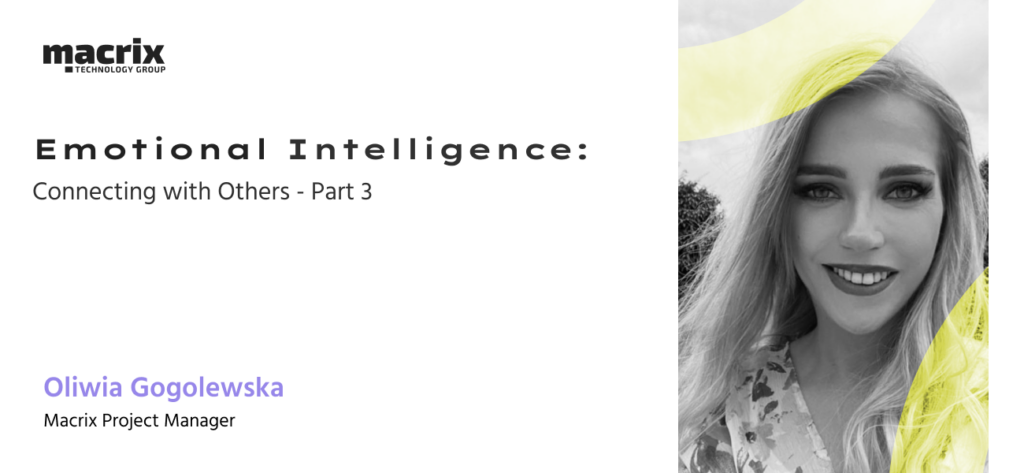
Welcome back to our discussion about Emotional Intelligence. What started as a single article idea has now expanded into a three-part series, and yet, it feels like we’ve only scratched the surface.
In our previous conversation, “Emotional Intelligence: The Inner Work – Part 2,” we looked at the internal components of EI: self-awareness, self-regulation, and self-motivation. These important aspects of EI can help us better understand our emotions as we treat them as tools and information.
Now, in this third, and last part of this article series we are about to explore deeper empathy and social skills. These skills are directed externally and are helping us nurture relationships and communication with others. As the poet and civil rights activist Maya Angelou once said: “People will forget what you said, people will forget what you did, but people will never forget how you made them feel.”. This quote reminds us of the impact that we have on others. Developing empathy and social skills can help us become more aware and intentional in our interactions.
I invite you to explore the world of empathy and social skills. How do these abilities shape our interactions with others? What valuable lessons can they teach us? Let’s find out together.

Empathy
Empathy is seeing with the eyes of another, listening with the ears of another, and feeling with the heart of another. – Alfred Adler
“Empathy” originates from a German term, “Einfühlung,” which means “feeling-in.” German philosopher Rudolf Lotze first used it in the late 19th century. Later, it was translated into English as “empathy.”
Empathy is an amazing ability. It helps you recognize, understand, and even share the thoughts and feelings of others, whether they’re people, animals, or even fictional characters in stories. With empathy, you sense unspoken emotions. Empathy is crucial for human interaction and building long-lasting relationships. Empathy is about stepping into someone else’s shoes, understanding their point of view, and responding with care.
Empathy is closely connected to being aware of your own emotions. It’s a big part of how we connect with others. Without it, you might not fully understand what someone else is going through, which can feel like “emotional deafness.”
The global leadership development company DDI places empathy at the top of the leadership skills list. Emotionally intelligent leaders can step into someone else’s shoes, which helps them to understand people better. Leaders who are good at understanding others are also friendly and approachable. This creates a positive and welcoming workplace where everyone feels involved and valued.
Let’s consider the following example in the workplace:
Meet Amelia, a project manager at a busy software development company. She’s leading a team of developers and designers working on a crucial project for an important client. During a daily meeting, one of her team members, Henry, seemed disengaged and frustrated. This was unusual because Henry had always been enthusiastic about his work.
What now? Instead of scolding Henry or ignoring his behavior, Amelia decided to approach him with empathy. She invited Henry for a one-on-one conversation to understand what was happening. During the conversation, she asked open-minded questions and actively listened to his responses.
Henry opened up about personal issues that had been affecting his performance at work. Amelia empathized with his situation and showed understanding. Together with Henry, they made adjustments to his workload and deadlines to address the challenges he was facing.
Amelia’s caring approach not only helped Henry overcome his obstacles but also had a positive impact on the entire team. Her willingness to listen and support her team members created a positive work environment where everyone felt appreciated and understood. Ultimately, Amelia’s use of empathy contributed to the well-being and motivation of her team.
How can you build your empathy?
Be Curious: Spend time with people you do not know very well, and ask them about themselves, how they are, and what their life is like. Follow people from many different backgrounds – religious, ethnic, and political – on social media and listen to what they have to say. When you travel, engage with locals. Invite that co-worker you do not know to lunch and be present with people when you talk to them – put away your phone and other screens.
Avoid Judgement: “People generally see what they look for and hear what they listen for” as Harper Lee wrote in her book “To Kill a Mockingbird.” We all have biases, and sometimes we make judgments without realizing it. The key is to become more aware of our thoughts. Instead of quickly deciding what someone is like, try to talk to them with an open mind and understand their point of view. It’s important to notice what we have in common and not be judgmental about our differences.
Active Listening: Listen to understand, not to respond. Give full attention to what others say, without jumping in or preparing your reply. Also, keep an eye out for nonverbal signals like body language and facial expressions. These signs often tell you more about someone’s feelings than their words do.
Put Yourself in Their Shoes: Try to step into their shoes, imagining how they feel and what they think based on their experiences. Think about various situations. Spend time with others to understand their worries, joys, and dreams. If someone’s actions are troublesome, think about the reasons behind them. For instance, if it’s a co-worker, don’t just recognize their stress, but also try to understand the difficulties they face every day.
Read: “A reader lives a thousand lives before he dies. The man who never reads lives only one.” said George R.R. Martin. Reading is one of the best ways to open your mind and empathize with the experiences of others. Explore different reading materials, like fiction, nonfiction, newspapers, journals, or online content, that introduce you to people from diverse backgrounds. This can help you become more emotionally aware and empathetic.
Join a Shared Cause: Research shows that participating in community projects can reduce biases and unite people. To make a positive impact you can engage in local or international community initiatives, collaborate with those from diverse backgrounds, or donate to charitable causes.
Stand Up for Others: When you witness discrimination or biased comments, it’s important to speak up, even if you’re not part of the affected group. You can make a difference.
Here are some examples:
- When someone interrupts another person, kindly intervene and suggest, “I believe she was still sharing her idea. Let’s ensure she gets a chance to finish before we move on.”
- When you encounter offensive jokes or comments, express your concern by simply saying, “What you just said is offensive.”
We’re all humans, and the desire to connect is deeply ingrained in us. It’s part of what makes us who we are. However, to truly foster these connections, we must work on understanding others and be open to challenging discussions. Our genetic makeup certainly plays a role in shaping us, but as we grow and experience life, we have the power to change and adapt. One of the keys to building meaningful relationships with the people we meet is developing empathy. This allows us to connect on a deeper level and better understand the perspectives of others.

Social skills
Man is by nature a social animal. – Aristotle
The first three elements of emotional intelligence (self-awareness, self-regulation, self-motivation) deal with self-management. The last two, empathy and social skills focus on our ability to work with others.
Now, you might wonder, what do I mean by social skills in the context of emotional intelligence? Well, they’re the abilities we use to understand and influence other people’s feelings. Picture this: a warm smile can make someone’s day brighter.
Social skills aren’t just about leadership, trust-building, or effective communication. They involve sensing the dynamics of a group and adjusting yourself to work in harmony with others. They are the key to making teamwork, collaboration, and cooperation smoother and more effective. These skills can lead to popularity, leadership opportunities, and success in your interactions. Those who excel in these areas truly stand out.
Oh, and guess what? Social skills are invaluable not only in your personal but also in your professional life! Nurturing your social skills can help you build strong connections with your co-workers. So why not develop them?
Social skills, in the Emotional Intelligence sense, include:
Persuasion – Persuasion is the art of inspiring and gaining support for your ideas or proposed course of action. It involves guiding others in a direction that benefits everyone involved.
Communication – Good emotional intelligence relies heavily on effective communication. It’s not only about expressing your thoughts but also sharing your feelings while being able to listen actively.
Conflict Management – Disagreements often pop up unexpectedly. Being skilled in resolving conflicts constructively is crucial for maintaining healthy relationships.
Leadership – Leadership involves motivating and guiding others. A good leader generates internal motivation that can make a whole group mobilize toward the same objective and uses emotions as a source of charisma.
Change Management – Navigating transitions without causing alienation among those involved.
Building Bonds (Rapport) – Building and sustaining relationships. People who are good at this are great networkers, building and maintaining a strong network of contacts and connections.
Team Work – Working well with others in a group or team setting. This includes being able to contribute positively, cooperate, and communicate effectively within a team.
What is your strongest skill, and which one do you consider your weakest?
Let’s consider the following example in the workplace:
In the software development team, a conflict arises between Emily, the QA engineer, and Levi, the senior developer. They disagree on whether an issue Emily reported is a bug or an intended feature. Emily sees it as a bug, while Levi considers it a feature.
Sensing the conflict, Chloe, their Product Owner, steps in to help. She organizes a meeting for Emily and Levi to explain their perspectives. Emily talks about how the issue affects the user experience negatively, while Levi dives into the technical details. Chloe acts as a middle person, guiding them to review the initial project requirements and specifications. They conduct further testing to verify the behavior in question.
Through this process, they confirm the issue is indeed part of the planned functionality, not a bug. Chloe suggests documenting any necessary clarifications for end-users in the product guide. By aligning on the understanding of the feature, Emily and Levi resolve the conflict.
Chloe’s conflict management skills were key. She ensured both sides were heard and guided them to find common ground by referring back to the project plans. By facilitating this understanding, she helped Emily and Levi to reach an agreement.
How can you improve your social skills?
Learn From the Best: Observe people in your life with great social skills. Notice how they start conversations, contribute, and greet others. Try to mimic their approach in your interactions.
Master Small Talk: Set a goal to initiate e.g. five small talks a day. Practice with friends, coworkers, or even strangers. The trick is to be genuinely interested in what they have to say, making the chat engaging for everyone.
Make Eye Contact: Feeling shy or nervous in social settings might reflect in your eyes. Boost your confidence by practicing eye contact in small steps. Try aiming your gaze at a spot close to the person’s eyes if direct eye contact feels too uncomfortable. Start with short eye contact, gradually increasing it in each conversation.
Give Genuine Compliments: Don’t hold back from giving compliments. They make people feel good about themselves and help improve connections. Be genuine and specific!
Practice Listening: Improving your communication skills starts with active listening. People love it when you hear and get them. When someone talks about their life, ask them a real question. You’ll see how much they like sharing more when they feel you care.
Visualize: Imagine yourself feeling confident while talking to new people and making connections with colleagues. Visualize how you’d handle tough conversations, making it easier to improve your social skills in real life.
Mind Your Body Language: Face the person you’re speaking to and pay attention to your tone and posture. How you carry yourself and your body language significantly impact social situations. Your body language can even influence how you feel, so be mindful of it!
Social skills are the heart and soul of success, both personally and professionally. They’re the key to understanding others’ feelings and improving how we interact and relate. Think about unresolved conflicts at work—they don’t just linger, study shows each unresolved conflict wastes about eight hours of company time in gossip and other unproductive activities! Picture the potential chaos if multiple issues remain unaddressed.
Closing Thoughts
As we come to the end of our exploration of Emotional Intelligence, it’s a good moment to pause and reflect. We’ve been on quite a journey, haven’t we? We’ve looked closely at our emotions, how they shape us, and how we can shape them in turn.
It’s fascinating how being aware of our emotions can change the way we experience the world. And how learning to manage them can make our lives so much smoother, and our relationships so much deeper.
And let’s not forget empathy. It’s like a superpower, isn’t it? Being able to step into someone else’s shoes, to understand what they’re feeling. It’s a skill that can make all the difference in our interactions with others.
And finally, social skills. They’re like the glue that holds it all together. Being able to communicate effectively, resolve conflicts, to work well with others. These are the skills that can turn a good life into a great one.
Let us remember that emotional intelligence is a lifelong journey. There’s always more to learn, more to explore.
May your path be filled with self-awareness, empathy, and meaningful connections with others.
Oliwia Gogolewska
Project Manager
References:
Goleman, D. (2005). “Emotional Intelligence.”
Goleman, D. (2004, January). What Makes a Leader. Harvard Business Review
SkillsYouNeed “ What is Empathy? “
Development Dimensions International. “Why Empathy Is the Number One Skill.”
The New York Times. “How to Be More Empathetic.”
Blinkist “How to Improve Social Skills.”
TED Ideas “5 Exercises to Help You Build More Empathy.”
https://unsplash.com/photos/a-heart-shaped-neon-sign-in-the-dark-ACt2UZwHsIk
https://unsplash.com/photos/two-children-playing-under-umbrella-on-seashore-yxwBJjtgtUs
Lorem ipsum dolor sit amet, consectetur adipiscing elit. Ut elit tellus, luctus nec ullamcorper mattis, pulvinar dapibus leo.

